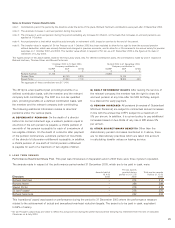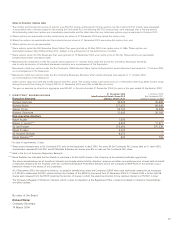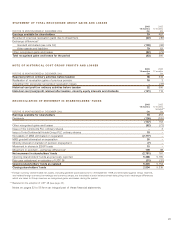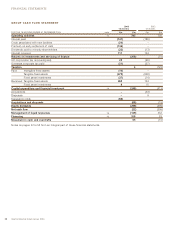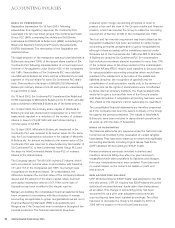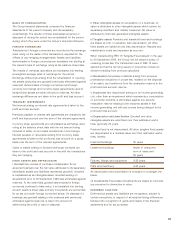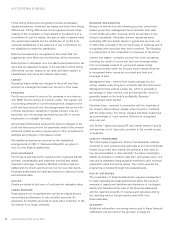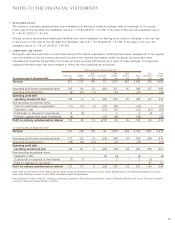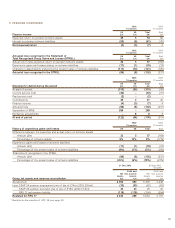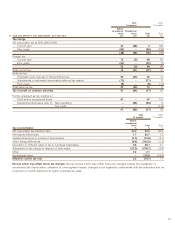Holiday Inn 2003 Annual Report Download - page 36
Download and view the complete annual report
Please find page 36 of the 2003 Holiday Inn annual report below. You can navigate through the pages in the report by either clicking on the pages listed below, or by using the keyword search tool below to find specific information within the annual report.34 InterContinental Hotels Group 2003
ACCOUNTING POLICIES
Those timing differences recognised include accelerated
capital allowances, unrelieved tax losses and short-term timing
differences. Timing differences not recognised include those
relating to the revaluation of fixed assets in the absence of a
commitment to sell the assets, the gain on sale of assets rolled
into replacement assets and the distribution of profits from
overseas subsidiaries in the absence of any commitment by
the subsidiary to make the distribution.
Deferred tax assets are recognised to the extent that it is
regarded as more likely than not that they will be recovered.
Deferred tax is calculated on a non-discounted basis at the tax
rates that are expected to apply in the periods in which timing
differences reverse, based on tax rates and laws enacted or
substantively enacted at the balance sheet date.
LEASES
Operating lease rentals are charged to the profit and loss
account on a straight line basis over the term of the lease.
PENSIONS
The Group continues to account for pensions in accordance
with SSAP 24 ‘Accounting for pension costs’. The regular cost
of providing pensions to current employees is charged to the
profit and loss account over the average expected service life
of those employees. Variations in regular pension cost are
amortised over the average expected service life of current
employees on a straight line basis.
Accumulated differences between the amount charged to the
profit and loss account and the payments made to the pension
plans are treated as either prepayments or other provisions for
liabilities and charges in the balance sheet.
The additional disclosures required by the transitional
arrangements of FRS 17 ‘Retirement Benefits’ are given in
note 5 to the financial statements.
SELF INSURANCE
The Group is self-insured for various levels of general liability,
workers’ compensation and employee medical and dental
insurance coverage. Insurance liabilities include projected
settlements for known and incurred, but not reported claims.
Projected settlements are estimated based on historical trends
and actuarial data.
STOCKS
Stocks are stated at the lower of cost and net realisable value.
TRADE DEBTORS
Trade debtors are recognised and carried at original amount
earned less an allowance for any doubtful accounts. An
allowance for doubtful accounts is made when collection of the
full amount is no longer probable.
REVENUE RECOGNITION
Revenue is derived from the following sources: owned and
leased properties; management fees; franchise fees; sale
of soft drinks and other revenues which are ancillary to the
Group’s operations. Generally, revenue represents sales
(excluding VAT and similar taxes) of goods and services, net
of discounts, provided in the normal course of business and is
recognised when services have been rendered. The following
is a description of the composition of revenues of the Group.
Owned and leased – primarily derived from hotel operations,
including the rental of rooms and food and beverage sales
from a worldwide network of owned and leased hotels
operated primarily under the Group’s brand names. Revenue
is recognised when rooms are occupied and food and
beverage is sold.
Management fees – earned from hotels managed by the
Group, usually under long-term contracts with the hotel owner.
Management fees include a base fee, which is generally a
percentage of hotel revenue, and an incentive fee, which is
generally based on the hotel’s profitability. Revenue
is recognised when earned.
Franchise fees – received in connection with the franchise of
the Group’s brand names, usually under long-term contracts
with the hotel owner. The Group charges franchise royalty fees
as a percentage of room revenue. Revenue is recognised
when earned.
Soft Drinks – sales (excluding VAT and similar taxes) of goods
and services, net of discounts, provided in the normal course
of business.
LOYALTY PROGRAMME
The hotel loyalty programme, Priority Club Rewards, enables
members to earn points during each stay at an InterContinental
Hotels Group hotel and redeem the points at a later date for
free accommodation or other benefits. The future redemption
liability is included in creditors less than, and greater than, one
year and is estimated using actuarial methods to give eventual
redemption rates and points values. The cost to operate the
programme is funded through hotel assessments.
USE OF ESTIMATES
The preparation of financial statements requires management
to make estimates and assumptions that affect the reported
amounts of assets and liabilities and disclosure of contingent
assets and liabilities at the date of the financial statements
and the reported amounts of revenues and expenses during
the reporting period. Actual results could differ from
those estimates.
GLOSSARY
Additional information concerning terms used in these financial
statements can be found in the glossary on page 64.



